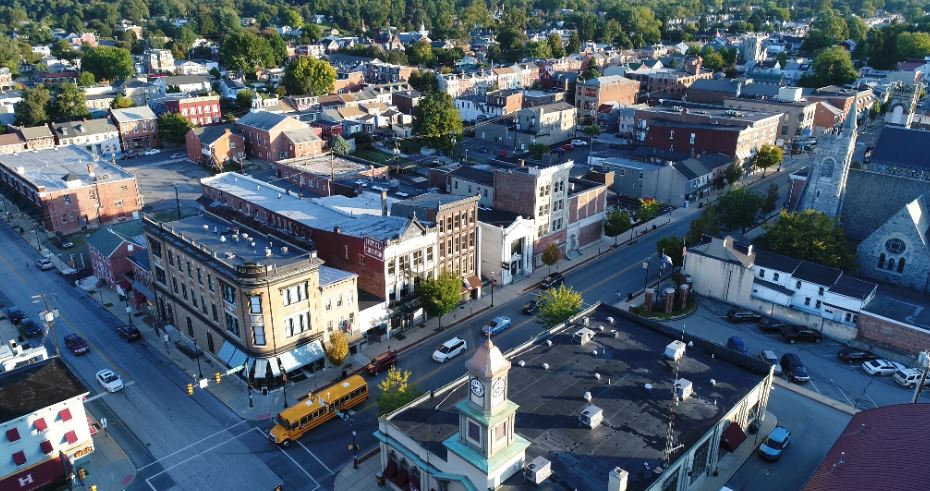
With Pennsylvania's eviction and foreclosure moratorium scheduled to end Monday, local officials and nonprofit leaders are hoping a last-minute local patch to a badly designed state program will be enough to stave off a wave of displacements.
The moratorium, enacted in March and extended in July, protects renters and mortgage holders who have lost income due to the coronavirus economic shutdown and cannot make their monthly payments.
But Gov. Tom Wolf said this week he does not have the authority to extend it past this coming Monday, Aug. 31. He called on the Republican-dominated state legislature to do so instead, but there have been no indications it plans to take action.
In a statement, Senate Majority Leader Jake Corman instead accused Wolf of "playing politics to cover legislative Democrats who are reeling politically from supporting his positions."
While rescinding the moratorium leaves both homeowners and renters vulnerable, renters are more likely to have low incomes and work in hard-hit industries such as retail and hospitality. For months, housing advocates have warned that lifting their protections will open the way for an unprecedented avalanche of evictions.
A cascade of crises
If it does, it will feed into other emerging crises, from the threat of utility shutoffs to parents trying to rework their schedules around their local school district's Covid-19 education plan.
The nonprofit community wants state legislators to start taking "a more comprehensive, systematic view," said Kevin Ressler, president of the United Way of Lancaster. (The United Way of Lancaster sponsors OneUnitedLancaster.com)
"Band-aid stopgap after stopgap isn't going to stop the bleeding when the proverbial tourniquet comes off," Ressler said.
According to Census data reported by Spotlight PA, about 400,000 households statewide say they were unable to make rent in July. Proportionally, that suggests more than 15,000 Lancaster County households may be in arrears.
Rental Relief
To help, the state created the $150 million, CARES Act-funded Rental Relief Program (there is a related program for homeowners). However, there's widespread agreement it's fatally flawed.
Previous coverage: Facing eviction due to Covid-19 income loss? This local network is ready to help
The No. 1 problem: It caps assistance at $750 per month per lessee, and requires landlords to accept the state's payments as full rent, whether they suffice or not.
Landlords and tenants both have to agree to participate, so if one side balks, there's no deal.
In much of the state, including here, $750 is well below market values. In Lancaster County, fair market rent is a little over $800 for a one-bedroom apartment, rising to nearly $1,400 for a four-bedroom, according to the U.S. Department of Housing and Urban Development.
A property owner might be willing to absorb a $50 monthly loss for a little while to help out a tenant, Lancaster landlord Noah Miller said. But $500 a month, or $1,000 — "that's not going to fly," he said.
In Philadelphia, according to the Spotlight PA report, two-thirds of the applications filed are in limbo because landlords won't take part.
Making both sides whole
Presumably, landlords would be far more open to the program if they received the full amount they're due. Accordingly, on Wednesday, the Lancaster County commissioners allocated $200,000 in federal CARES Act funds for a supplementary fund to make that happen.
"There's a lot of need out there," County Commissioner Ray D'Agostino said before the vote. "The faster we can get this money deployed, the better."
The $200,000 is equal to 10% of the state's initial Rental Relief allocation to Lancaster County of $2 million.
Depending on circumstances, the supplemental dollars can be used in combination with Rental Relief funds, potentially including applications already processed, and also when an individual tenant doesn't meet the state's eligibility requirements, said Justin Eby. He is deputy executive director of the Lancaster County Redevelopment Authority, which administers the Rental Relief program locally.
"This would make both the tenant and landlord whole," Eby said.
If $200,000 isn't sufficient, the county can make additional funds available, he said.
The hope, however, is that state legislators reform the Rental Relief Program and makes the changes retroactive. If that happens, the state could reimburse the county, which could then redeploy the funds toward other components of its Covid-19 response.
By the numbers: Lancaster County Rental Relief Program
- No. of applications submitted: 334
- No. approved: 81
- Rent $750 or below: 55 (68%)
- Rent above $750: 26 (32%)No. approved: 81
- Funding available: $2 million
- Disbursed to date: $204,595 (10.2%)
Source: Lancaster County Redevelopment Authority. Data as of Friday, Aug. 28.
Few applications, fewer approvals
The $750 cap isn't the Rental Relief Program's only shortcoming. The application process is detailed and cumbersome, leading to long delays in completing forms, providing all the necessary documents and vetting eligibility. And landlords and tenants can't apply until the tenant is at least one month behind.
In Lancaster, a coalition of nonprofits, members of the county Eviction Prevention Network, is assisting the Redevelopment Authority with the process.
As of Friday, out of 334 Lancaster County applications completed and submitted to the state, 81, or a little under one-quarter, had been approved for payment.
Brittany Mellinger is director of housing equality and equity at the Lancaster Housing Opportunity Partnership, LHOP. She advised potential applicants to talk frankly with each other: Landlords with tenants, tenants with landlords.
For the application process to go smoothly, it's important to get everyone on the same page.
"Many folks have never been in this position before," she said, but that's OK: "There's no shame around it."
"There are many people in their exact same position," she said, "and that's what these funds are there for."





